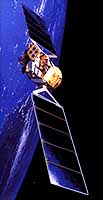| . |  |
. |
 Taipei (AFP) October 25, 1999 - Taiwan is to award French company Matra-Marconi Space a satellite contract after the German government refused to issue the required export license, a report said Monday.
Taipei (AFP) October 25, 1999 - Taiwan is to award French company Matra-Marconi Space a satellite contract after the German government refused to issue the required export license, a report said Monday.Martra-Marconi worked out details of the contract here Friday with the National Space Programme Office (NSPO), the widely circulated China Times said. Huang Chen-tai, chairman of the National Science Council which oversees the island's space program, said "due to its sensitivity, I really cannot delve into the report." But he did concede claim Beijing's intervention in the deal with DASA Dornier, the German firm contracted to manufacture the satellite dubbed "ROCSAT-2." "Through their diplomatic channels, the Chinese communists pressured the German government to stop giving the needed export license." The paper said with the assistance of French deputies, Matra-Marconi has received a guarantee from the French government allowing the export of remote control reconnaisance expertise to Taiwan. Quoting "reliable sources," the paper said Beijing would not object to the deal after the French side promised the satellite would not be converted for military use. "After last week's negotiations, it is almost fixed that Matra-Marconi is to replace DASA Dornier," the German company which beat the French competitor to win the bidding in January, the paper said. The satellite was due to be launched in 2003, according to the contract the NSPO agreed with Dornier. The paper said the German government decided not to give the export license Dornier required four months ago "in order not to further exacerbate its ties with Beijing" which have been harmed by NATO's bombing of the Chinese embassy in Belgrade in May. Beijing opposes all arms sales to the nationalist island which it has regarded as a breakaway province since their separation in 1949 at the end of a civil war. The paper said the NSPO began contacts with Matra-Marconi after it was certain Dornier would be unable to honor the contract. Taiwan's first fully owned science satellite ROCSAT-1 was put into orbit in January. The island in October 1991 launched a 15-year space program at an estimated cost of 13.6 billion Taiwan dollars (428.2 million US). Taiwan also aims to put into orbit eight micro-satellites weighing about 40 kilograms (85 pounds) each. A 50-50 joint venture communications satellite with Singapore was launched in late August 1998 and began commercial service. The venture costs 240 million US dollars. Copyright 1999 AFP. All rights reserved. The material on this page is provided by AFP and may not be published, broadcast, rewritten or redistributed.
MILSPACE
|
| |||||||||
| The content herein, unless otherwise known to be public domain, are Copyright 1995-2016 - Space Media Network. All websites are published in Australia and are solely subject to Australian law and governed by Fair Use principals for news reporting and research purposes. AFP, UPI and IANS news wire stories are copyright Agence France-Presse, United Press International and Indo-Asia News Service. ESA news reports are copyright European Space Agency. All NASA sourced material is public domain. Additional copyrights may apply in whole or part to other bona fide parties. Advertising does not imply endorsement, agreement or approval of any opinions, statements or information provided by Space Media Network on any Web page published or hosted by Space Media Network. Privacy Statement All images and articles appearing on Space Media Network have been edited or digitally altered in some way. Any requests to remove copyright material will be acted upon in a timely and appropriate manner. Any attempt to extort money from Space Media Network will be ignored and reported to Australian Law Enforcement Agencies as a potential case of financial fraud involving the use of a telephonic carriage device or postal service. |